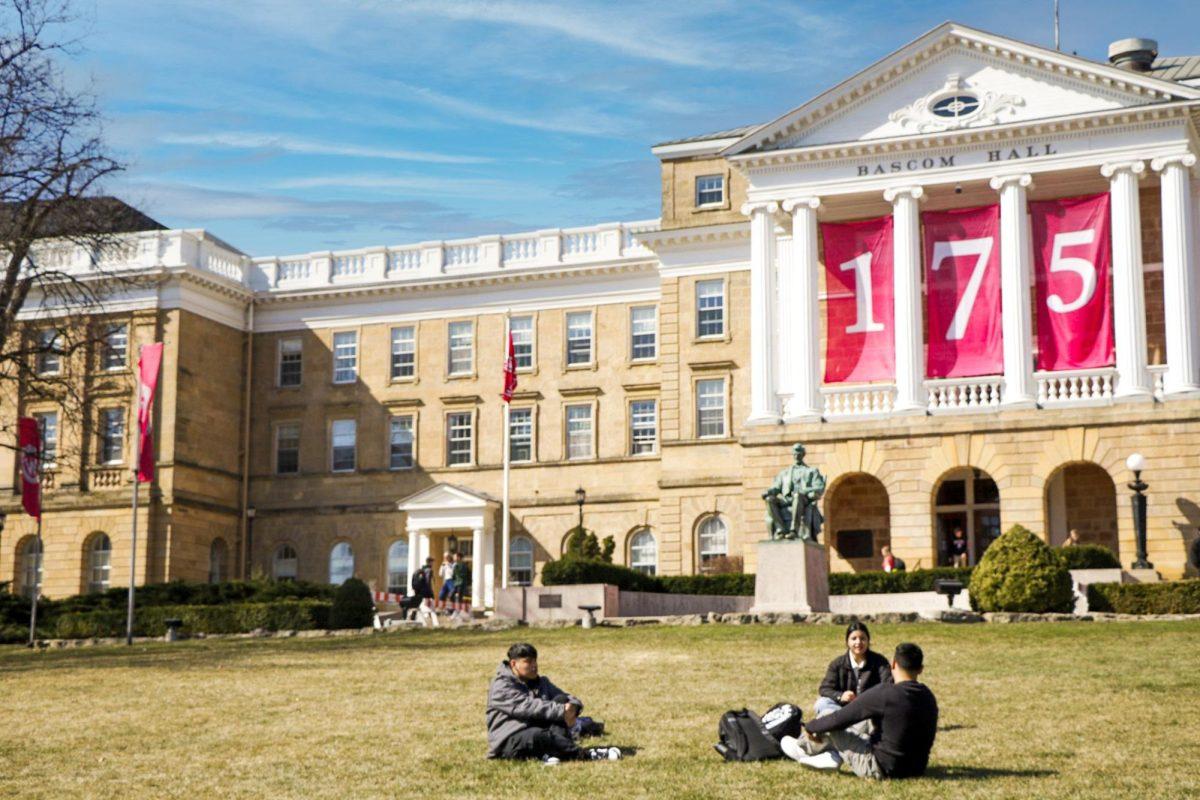In what seems like a never-ending saga, the crusade to improve the University of Wisconsin's disciplinary policy could be facing yet another hurdle.
The current policy received intense criticism beginning last fall for its lack of expedience in firing felonious faculty, and has since stirred up more issues regarding possible constitutional flaws and, most recently, the authority of faculty governance groups.
While the UW Board of Regents maintains the most important issue at stake is fixing what some have called a botched, cumbersome dismissal policy, faculty governance groups insist there are other concerns to be noted.
"State law requires faculty approval whenever the Board of Regents goes about attempting to promulgate rules and procedures for the dismissal of faculty," said Madison attorney Steven Underwood, who has represented the Committee on Academic Freedom and Rights for the past 10 years. "The board has all the authority to run the system except where limited by state statutes."
Underwood pointed to a statute in chapter 36 of Wisconsin state law, which he said clearly demonstrates the faculties' right to a voice in whether or not the policy is passed.
According to the statute, "the board and its several faculties … shall promulgate rules … for the nonretention and dismissal of faculty members."
While lawyers for the faculty groups and lawyers for the UW System disagree on the interpretation of the statute, regents and faculty members continue their power struggle.
Since many of the proposed policy changes have come in light of suggestions to the board from the faculty groups, and both sides are finally beginning to agree on the new policy's wording, Board of Regents President David Walsh is urging the faculty groups to "deal with the substance rather than the process."
"We have a respectful disagreement," Walsh said in an interview. "They are losing their perspective. This is a terrible issue for them to fight over. It would be one thing if we were talking about tenure, but we're talking about criminals."
But faculty governance groups believe the protection of authority granted to them under state law is worth fighting for.
"What I'm trying to point out and make clear to the Board of Regents is that … this is the only tiny little area where faculty has a say that counts," Underwood said. "[The faculty groups] are as rational and sane and responsible as you can find. They should have a say."
How it all began
The newest complication in the attempt to revise the UW's faculty dismissal process has been one of many hurdles regents and faculty groups have faced since last fall when it all began.
Controversy arose with the revelation that three UW faculty members had remained on the payroll even after they had been charged and convicted of serious felonies.
Comparative literature professor Lewis Keith Cohen was sentenced to a 30-day jail term and two years probation in the summer of 2005, yet he continued to work at UW even after his incarceration began by means of an unsupervised work release. His conviction was for child enticement, as he had sent suggestive photos to a 14-year-old boy and attempted to meet him at a local Subway restaurant. He was eventually terminated from his tenured position in April 2006.
Assistant medical school professor Steven Clark, another of the highly publicized felons, was convicted of stalking and was sentenced to a one-year term. The regents accepted Clark's resignation submission last April, which did not actually take effect until Aug. 15.
The other high-profile faculty felon, medical physiology professor Roberto Coronado, is currently serving an eight-year prison sentence for child molestation and was dismissed from UW in February 2006.
As an outraged public called for something to be done to more quickly remove felonious faculty members from the university and its payroll, Walsh appointed a special committee — the Committee on Faculty and Academic Staff Disciplinary Process — to review the current policy and propose relevant revisions.
Following five meetings between November 2005 and February 2006 where committee members hammered out details according to Walsh's request, they developed a proposal for an expedited procedure to be used in cases of serious criminal misconduct.
That proposal was subsequently forwarded to faculty governance groups across the state for review, and many sounded off in response to what they believed was disregard for due process or attacks on tenure.
After collecting faculty feedback this summer, the board revised its proposal — loosening its structure in many of the places faculty had been up in arms over.
Just when it seemed the two sides were nearing a comfortable medium, up came another hurdle.
The hurdle
The Board of Regents and faculty groups alike agree the dismissal policy must be changed; it's just that who has authority over the decision-making is shaping up to be a separate struggle.
UW political science professor Donald Downs said shared governance has long been an issue for UW faculty, and this case simply falls in line. He and Raymond Spoto, UW-Platteville professor and faculty leader, cited a UW-Superior case in which they say a professor charged and later cleared of criminal activity was fired unfairly as evidence of a trend.
According to Downs and Spoto, faculty groups challenged the regents' decision in the case but never received a response.
"That case is still being litigated in the courts," Downs said. "When this new issue came up, we immediately saw it as a shared governance issue."
Spoto expressed similar sentiments, saying faculty groups across the state recognize the need to protect faculty rights to shared governance.
Although he said what he would really like to see is collective bargaining for the faculty groups, he maintains, "What we have is shared governance, and we have to use it. We're not just a sounding board."
Despite his strong criticisms, Spoto does not necessarily blame the regents for what he sees as a disregard for appropriate authority.
Asked if he thought the regents are afraid to give faculty governance groups decision-making authority in this case, he said, "Not afraid, but a lot of them simply are unaware of the fact that they need to do this. They see it as an annoyance that they have to go through this extra step."
According to UW System General Counsel Patricia Brady, the board is going about the issue exactly as they should.
"We've consulted extensively with the faculty, and they have until the end of the month [to submit reviews]. We believe we are complying with the law by gathering their input," she said, adding that while faculty consultation is important and the board has pursued it, "the board actually has the authority to promulgate code."
That point marks the disagreement, as Underwood — the attorney representing the faculty groups — maintains an accurate reading of the law calls for shared decision-making.
"Generally, when three or more bodies politic are assigned, the majority rules," he said. "A majority of the 15 faculty senates would have to approve it."
Warning that without appropriate faculty approval, the rules could be subject to legal challenge by anyone fired under them, Underwood said a "rational response" from the faculty could be to say, "We'd approve it if you'd recognize that we have that right, and if not, we're not going to approve it for that reason."
Asked what the board might do if faculty groups refused to grant their approval, Regent Brent Smith said he hoped the process could proceed regardless, adding that the most important issue is to mend the weak policy.
"I'm not saying the process isn't important, but it seems to me like the substance of the matter is what we're aiming to fix here," he said. "And I thought we were pretty close to agreeing [on the revised policy]."
Will it work?
Amid disagreement over who calls the shots, a new dismissal policy is near completion — barring any further complications, of course.
The most recent draft contains revisions responding directly to faculty concerns. Significant changes from the original policy include the definition of "serious criminal misconduct," responsibility to self-report a felony charge or conviction, burden of proof and the role of the provost in triggering dismissal procedures.
Where faculty groups had called the regents' first wave of possible revisions unconstitutional in many ways, dissonance is now nearly nonexistent.
"In terms of substance, we think it is good enough," Downs said, acknowledging many of the changes came in response to input from the UW-Madison faculty and that the regents have been largely supportive of faculty efforts.
Even Spoto, a tough critic of the regents' actions throughout this issue, showed signs of agreement with a revised policy.
"If it's written in a way that will protect due process and academic freedom," he said, "reasonable people will come to the conclusion that it has to be approved."
Smith expressed a similar view, saying, "The bottom line is [creating] a more expeditious process that still protects the rights of the employee involved."
According to Walsh, the revised policy does just that.
"I think it's an excellent document. I think the changes have been constructive and helpful, and have changed in direction from where we started," he said. "I would hope [the faculty groups] approve it. I trust their good judgment."
The bottom line, Walsh said, is to address the need for a disciplinary process that works — and soon.
"This is such an embarrassing process," he said. "It's broken and it needs to be fixed."














